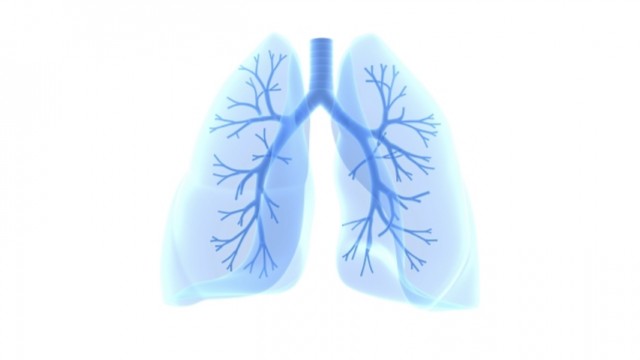Deep learning — a form of artificial intelligence — was able to detect malignant lung nodules on low-dose chest computed tomography (LDCT) scans with a performance meeting or exceeding that of expert radiologists, reports a new study from Google and Northwestern Medicine.
copyright by news.northwestern.edu
 This deep-learning system provides an automated image evaluation system to enhance the accuracy of early lung cancer diagnosis that could lead to earlier treatment. The deep-learning system was compared against radiologists on LDCTs for patients, some of whom had biopsy confirmed cancer within a year. In most comparisons, the model performed at or better than radiologists.
This deep-learning system provides an automated image evaluation system to enhance the accuracy of early lung cancer diagnosis that could lead to earlier treatment. The deep-learning system was compared against radiologists on LDCTs for patients, some of whom had biopsy confirmed cancer within a year. In most comparisons, the model performed at or better than radiologists.
Deep learning is a technique that teaches computers to learn by example.
The deep-learning system also produced fewer false positives and fewer false negatives, which could lead to fewer unnecessary follow-up procedures and fewer missed tumors, if it were used in a clinical setting.
The paper was published in Nature Medicine May 20.
“Radiologists generally examine hundreds of two-dimensional images or ‘slices’ in a single CT scan but this new machine learning system views the lungs in a huge, single three-dimensional image,” said study co-author Dr. Mozziyar Etemadi, a research assistant professor of anesthesiology at Northwestern University Feinberg School of Medicine and of engineering at McCormick School of Engineering. “AI in 3D can be much more sensitive in its ability to detect early lung cancer than the human eye looking at 2-D images. This is technically ‘4D’ because it is not only looking at one CT scan, but two (the current and prior scan) over time.
“In order to build the AI to view the CTs in this way, you require an enormous computer system of Google-scale. The concept is novel but the actual engineering of it is also novel because of the scale.”
Etemadi leads his research team while also in anesthesiology residency training at Northwestern as part of a unique residency research track.
Thank you for reading this post, don't forget to subscribe to our AI NAVIGATOR!
Etemadi’s dual roles allow research in his lab to traverse the technological and communications boundaries between healthcare and engineering. His lab is based inside one of the intensive care units at Northwestern Memorial Hospital to allow seamless communication among engineers and nurses, physicians and other care providers.
“This area of research is incredibly important, as lung cancer has the highest rate of mortality among all cancers, and there are many challenges in the way of broad adoption of lung cancer screening,” said Shravya Shetty, technical lead at Google. “Our work examines ways AI can be used to improve the accuracy and optimize the screening process, in ways that could help with the implementation of screening programs. The results are promising, and we look forward to continuing our work with partners and peers.”
Lung cancer is the most common cause of cancer-related death in the United States, resulting in an estimated 160,000 deaths in 2018.[…]
read more – copyright by news.northwestern.edu


Deep learning — a form of artificial intelligence — was able to detect malignant lung nodules on low-dose chest computed tomography (LDCT) scans with a performance meeting or exceeding that of expert radiologists, reports a new study from Google and Northwestern Medicine.
copyright by news.northwestern.edu
Deep learning is a technique that teaches computers to learn by example.
The deep-learning system also produced fewer false positives and fewer false negatives, which could lead to fewer unnecessary follow-up procedures and fewer missed tumors, if it were used in a clinical setting.
The paper was published in Nature Medicine May 20.
“Radiologists generally examine hundreds of two-dimensional images or ‘slices’ in a single CT scan but this new machine learning system views the lungs in a huge, single three-dimensional image,” said study co-author Dr. Mozziyar Etemadi, a research assistant professor of anesthesiology at Northwestern University Feinberg School of Medicine and of engineering at McCormick School of Engineering. “AI in 3D can be much more sensitive in its ability to detect early lung cancer than the human eye looking at 2-D images. This is technically ‘4D’ because it is not only looking at one CT scan, but two (the current and prior scan) over time.
“In order to build the AI to view the CTs in this way, you require an enormous computer system of Google-scale. The concept is novel but the actual engineering of it is also novel because of the scale.”
Etemadi leads his research team while also in anesthesiology residency training at Northwestern as part of a unique residency research track.
Thank you for reading this post, don't forget to subscribe to our AI NAVIGATOR!
Etemadi’s dual roles allow research in his lab to traverse the technological and communications boundaries between healthcare and engineering. His lab is based inside one of the intensive care units at Northwestern Memorial Hospital to allow seamless communication among engineers and nurses, physicians and other care providers.
“This area of research is incredibly important, as lung cancer has the highest rate of mortality among all cancers, and there are many challenges in the way of broad adoption of lung cancer screening,” said Shravya Shetty, technical lead at Google. “Our work examines ways AI can be used to improve the accuracy and optimize the screening process, in ways that could help with the implementation of screening programs. The results are promising, and we look forward to continuing our work with partners and peers.”
Lung cancer is the most common cause of cancer-related death in the United States, resulting in an estimated 160,000 deaths in 2018.[…]
read more – copyright by news.northwestern.edu
Share this: